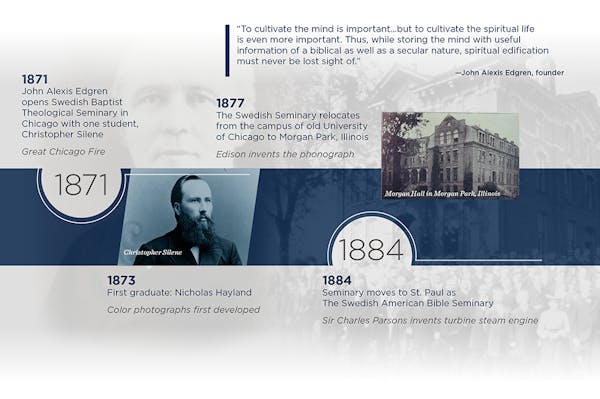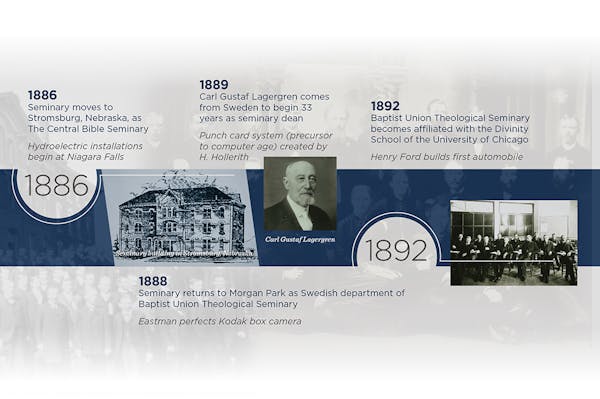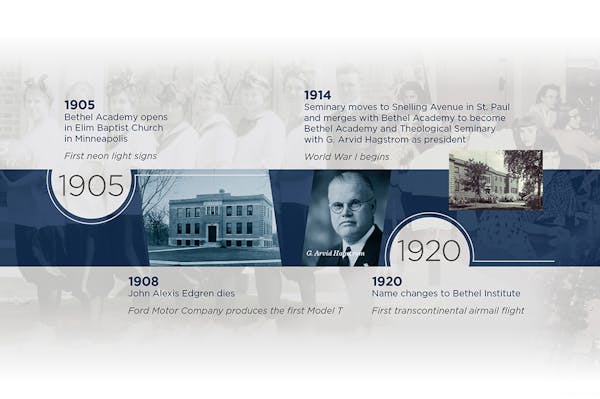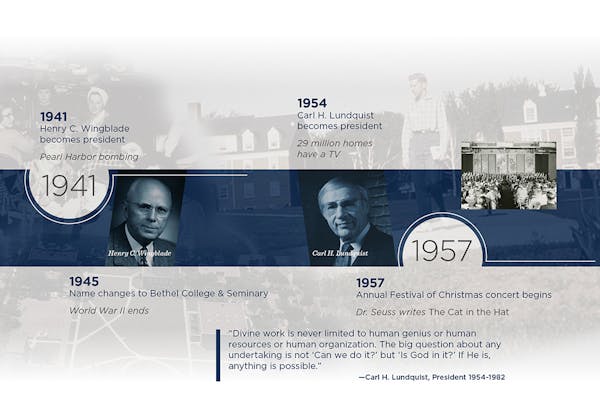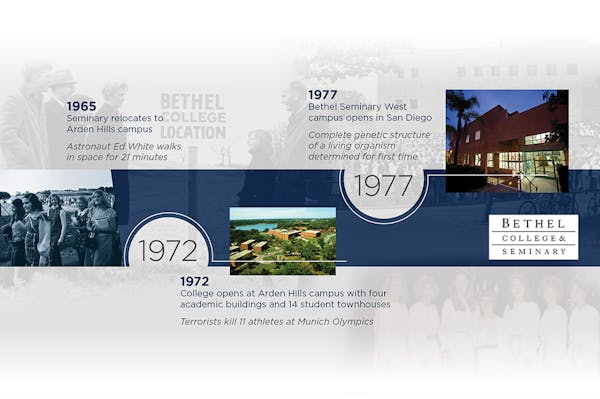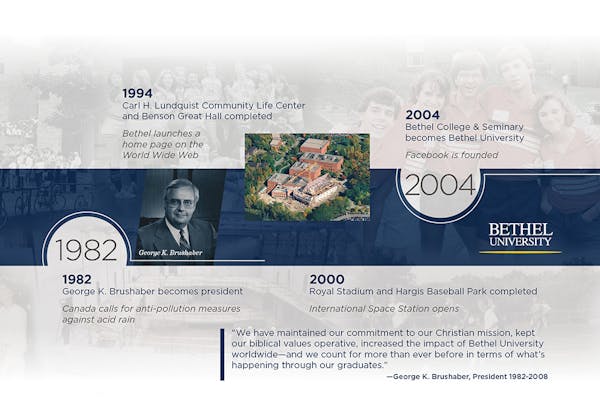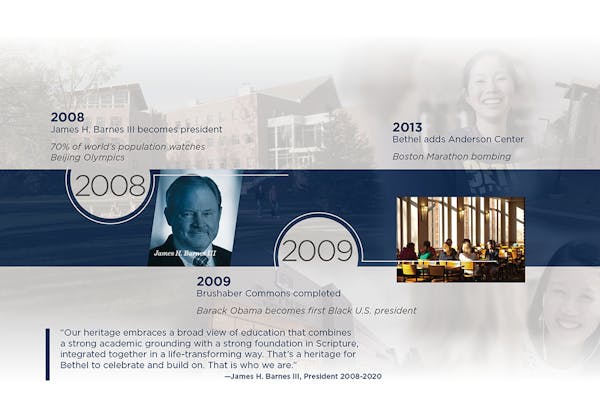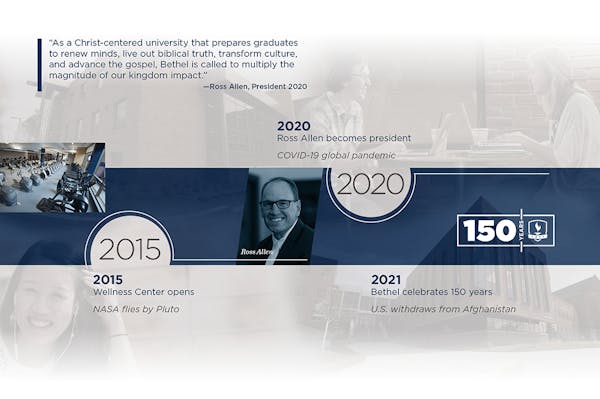150 Years of History: A Vision For Eternity
By Cherie Suonvieri ’15, GS’21, Jenny Hudalla ’15, GS’21, Michelle Smith Westlund ’83, S’22, with historical highlights by Chris Gehrz, Bethel University Professor of History
March 31, 2022 | 9 a.m.

design by Darin Jones '97
This story originally appeared in the winter 2022 issue of Bethel Magazine.
Bethel University began as a seminary in Chicago founded in 1871 by Swedish immigrant John Alexis Edgren. The Great Chicago Fire nearly destroyed his dream. But the day after the fire, another Swedish immigrant, Christopher Silene, made his way through the smoldering ruins, looking for Edgren. Silene became Bethel’s first student.
Bethel literally rose from the ashes in Chicago to an eventual location in St. Paul, and in 1965, to its current campus in Arden Hills, adding a second, nearby campus location—the Anderson Center—in 2018. At each step of the journey, God provided the means—sometimes miraculously—for further growth and impact.
For nearly 150 years, Bethel University has repeatedly responded to change with flexibility and discernment, while remaining steadfastly faithful to the principles upon which it was founded. In each generation, Bethel has trained faithful leaders who—like Christopher Silene—will walk through the fire to pursue their call.
The 21st century poses challenges unique to history. Technology is paramount. Change happens at lightning speed. Like never before, our world needs the courage of committed leaders who will stand up for faith, justice, and truth. And Bethel is ready. In fact, we’ve been preparing for this moment for 150 years.
— Chris Gehrz, Professor of History
Bethel History 101
As Bethel celebrates its sesquicentennial, Professor of History Chris Gehrz was inspired to reflect on the university’s history. Here, he outlines five turning points that provide highlights of Bethel’s story through the beginning of the 21st century.
Beginnings. Bethel’s beginning in 1871 is more dramatic than most: immigrants studying to prepare for ministry amid the embers of the Great Chicago Fire. About 20 years after pietistic Swedish Baptist immigrants began to organize in the United States, preacher and Union Navy veteran John Alexis Edgren organized a new seminary in Chicago. Its intended host—the first Swedish Baptist Church—had burned down, so Edgren opened his school as the Swedish department of the Baptist Theological Union. At first there was but one student, with a second joining halfway through the year. Slow growth continued over a difficult first 20 years. After temporary moves to St. Paul, Minnesota, and Stromsburg, Nebraska, the Swedish Baptist Theological Seminary returned to the Morgan Park neighborhood of Chicago.
— G.W. Carlson and Diana Magnuson, Bethel historians
A Home in St. Paul. In 1914, the Swedish Baptist Seminary returned to St. Paul, Minnesota, merging with a nine-year-old high school called Bethel Academy. Even as World War I broke out in Europe, Bethel Academy and Seminary erected buildings across the road from the Minnesota State Fairgrounds. After barely surviving the global conflict, Bethel grew in the 1920s, with the seminary gradually joining the academy in adopting English as its language of instruction. The academy didn’t survive the Great Depression, closing in 1936, but a new junior college (established in 1931) continued.
A Four-Year Institution. In the 1940s, then-Bethel Institute struggled to stay afloat during World War II, when most college students either entered the military or took good-paying war industry jobs. But the G.I. Bill spurred a postwar surge in enrollment, to the point that Bethel not only had an American Legion Post on campus, but had to house some of its students in a fairgrounds building. To both accommodate the more expansive expectations of those federally-funded students and meet new requirements for the training of pastors and teachers, Bethel College became a four-year institution in 1947. “Perhaps not even the bravest of our forebears included such a picture in his dreams of faith,” wrote the denomination’s magazine. “Doors are ajar to great vistas of service for Christ in the field of Christian education.”
— Carl H. Lundquist, President 1954-1982
Growth and Expansion. In 1954, Bethel hired a new president, Baptist pastor Carl H. Lundquist, a graduate of Bethel Theological Seminary. Lundquist linked Bethel to the larger neo-evangelical movement (serving as president of the National Association of evangelicals in 1978-1980) and helped the school find a more distinctive religious heritage in Pietism. During his tenure, the student body doubled in size twice, and Bethel outgrew its urban campus. After purchasing more than 200 lakeside acres of former dynamite testing grounds from the DuPont Company, Bethel began to relocate to the tiny suburb of Arden Hills: the seminary in 1965, then the college seven years later. Also in the ’70s, the seminary added a West Coast campus in San Diego. Under Lundquist’s leadership, both the college and the seminary became accredited.
Becoming Bethel University. In 1982, after serving seven years as Bethel’s dean, George Brushaber became president—and faced a looming enrollment decline. But Bethel resumed its pattern of growth as the 20th century ended: not only in the college, but with the beginning of the school’s first degree-completion and non-seminary graduate programs. Bethel College & Seminary became Bethel University in 2004. Having already presided over the construction of a still-stunning concert hall and a new residence hall, Brushaber retired in 2008 as a new student commons bearing his name neared completion.
Loading Gallery...
Highlights of Bethel University history
Consistently Christ-Centered
In his 26 years as president, George Brushaber was instrumental in Bethel’s rise to regional and national prominence. Under his leadership, the number of undergraduate and graduate programs offered by Bethel grew from 57 to more than 140. Enrollment tripled to more than 6,300 students across four schools. Nineteen major building or remodeling projects were completed. His most vital legacy, though, was keeping Bethel true to its Christ-centered mission and values, ever growing in spiritual vitality.
— George K. Brushaber, President 1982-2008
Brushaber also paved the way for Bethel’s next long-term leader, hiring Jay Barnes as Bethel’s provost in 1995. In 2008, Barnes became the fifth president of Bethel University. During his tenure, Bethel strengthened academics in measurable ways and became a national leader in study abroad. The main campus continued to grow with the addition of a Wellness Center and ongoing work on new and remodeled spaces for the sciences. And Bethel acquired the Anderson Center, a second location housing administrative offices and post-traditional programs, including Bethel Seminary.
Barnes’ particular passion for Bethel’s core value of reconciliation contributed to the Bethel community’s growth of diversity in race, ethnicity, and ability during his presidency. Between 2014 and 2019, Bethel launched the Act Six program for young Christian leaders from urban communities; the BUILD program for students with intellectual disabilities; the Cultural Connection Center, which strengthened the multicultural fabric of the university; and the Office of Military and Veteran Services, which empowered military-affiliated students. Barnes retired in 2020, and Bethel tapped Ross Allen ’84—the first Bethel University alumnus to lead the institution—as its sixth president.
A Vision for the Future
Throughout the course of its history, Bethel University has held fast to its commitment to providing Christ-centered education. Bethel continues to prepare graduates to renew minds, live out biblical truth, transform culture, and advance the gospel—and the university also feels called to multiply the impact. In its 150th year, Bethel University is rallying around three focus areas that President Ross Allen has created to propel the institution forward in this season of change: strengthening faith commitment, growing enrollment, and enhancing the student experience.
A renewed commitment to faith is not to say that Bethel has digressed from its founding, but rather that Bethel is prepared to lean in ever further. While faith is well-integrated into all that Bethel does on an individual level, Allen sees an opportunity to more meaningfully integrate a shared Christian faith with the university’s operations. Over the span of the next year, Bethel will establish systems and processes to more intentionally embed faith into the work and relationships of its community members. “Facilitating the spiritual formation of students is not the work of one person—that work belongs to all of us,” Allen says. “We are committed to enhancing individual efforts with institutional support.”
— Ross Allen, President 2020
Like strengthening its faith commitment, growing Bethel’s enrollment will be a community-wide endeavor. With cross-departmental participation, Bethel will focus on important work like enhancing affordability, broadening its market, identifying new audiences, and increasing capacity for academic innovation. Together, the university community will work to grow enrollment, and growing enrollment will lead to growing impact.
And finally, meaningfully enhancing the student experience will be a critical step forward as Bethel invites more people into the work that God is doing through the university. This will be accomplished by making structural changes, creating new academic pathways, and ensuring that the skills, passions, and experiences of all community members are being utilized to positively impact every student.
An Unchanging Mission
As founder John Alexis Edgren said, we “measure our performance by what God accomplishes through our graduates after they have been prepared at Bethel to go out into the world to serve.” From 1871 through today, this commitment reflects Bethel’s unchanging mission. We look back on 150 years of God’s provision, which has allowed us to offer transformative, Christ-centered education. We look out at our graduates leading the way as truth-seekers, world-changers, and reconcilers. And we look ahead to the future, knowing that we’ve only just begun.

Celebrate with us!
Join us at Bethel University's 150th Celebration, a fundraising event to rejoice in all that God has accomplished through Bethel thus far and to help propel the university into all that God has planned.
